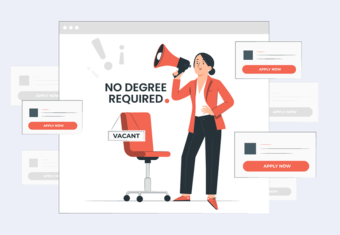Given that 57% of employers ask about salary expectations at some point in the hiring process, it’s essential to be ready in case this question comes up in an interview setting.
To help you talk numbers with confidence, we asked 7 hiring and career experts how you can effectively answer interviewers when asked about salary, and provide example scripts that you can use.
1. Know your worth before the interview
Before you go into an interview, you should have a clear idea of what kind of salary range is fair. Otherwise, you risk getting lowballed by employers or passed up because they think you’re asking for too much.
Kolby Goodman, Career Coach and Candidate Experience Expert at The Job Huntr, believes negotiation starts “the second you submit your application.”
The salary your next employer is willing to pay you is in direct correlation to the kind of impact they think you’re going to be able to make.
Kolby Goodman, Career Coach and Candidate Experience Expert at The Job Huntr
Goodman urges candidates to clearly demonstrate their value and achievements in their resumes, cover letters, and LinkedIn profiles, noting that quantifying your contributions early on can significantly influence salary negotiations.
To help you get prepared before the interview, you’ll want a game plan for how you’ll expand on the information in your resume and cover letter, rather than just repeating information.
You can try preparing a list of your documented experiences and achievements, and get ready to elaborate on them with detailed examples of your successes.
Knowing the appropriate salary ranges for your role, based on your experience and location, is also a key step in negotiating your salary.
Travis Lindemoen, Founder of Enjoy Mondays, recommends job applicants to always do their homework when researching a company. He says:
“Going into an interview or negotiation without a solid understanding of typical salary ranges for the role, your skillset, and your geographic area is going to set you up for failure.”
Nicole Griffin, a Talent Acquisition Leader at Korn Ferry, notes that many job seekers benefit from learning about the standard pay rates for their skills, saying:
With so many resources available, including companies revealing their pay ranges, there’s no reason not to be ready for a conversation about salary.
Nicole Griffin, Talent Acquisition Leader at Korn Ferry
Here are some ways you can equip yourself for a successful salary discussion before an interview:
- Check salary comparison websites – Platforms such as Glassdoor, Payscale, and Indeed offer up-to-date insights into market rates specific to your role, industry, and geographic location.
- Understand pay transparency laws – Familiarize yourself with the pay transparency laws in your state or city. These laws may require companies to disclose salary ranges or restrict them from asking about your past salaries. Resources such as the United States Department of Labor (DOL) and the Equal Employment Opportunity Commission (EEOC) can offer up-to-date information.
- Conduct mock interviews – Practice interviewing with someone you trust to get better at talking about your salary expectations and get feedback on your communication style, body language, and overall performance.
2. Redirect the question if necessary
If you’re asked about your salary expectations during an interview, you should respond tactfully while keeping the conversation focused on your qualifications and how they fit the requirements of the role.
John Goodison, Senior Manager of Talent Acquisition at the University of Phoenix, warns against being overly vague.
He recommends avoiding phrases that seem flexible but lack clarity, such as: “My salary expectations are negotiable.” or “I’m comfortable with your published salary range.”
In a situation where your target role’s salary range isn’t already published in the job ad — and the interviewer asks for your salary expectations, Goodison encourages candidates to politely but directly ask the interviewer about the salary range available for the position.
If they don’t have a salary range available, you can ask them what the company’s budget is.
Below are three ways to tactfully address salary expectations:
If you want to deflect the question
- “Thank you for bringing this question up. I’d love to know the approved salary range for this role.”
- “Thanks, I appreciate your question about my salary expectations. To ensure we’re aligned, could you please provide the salary range you’re considering for this position?”
- “Thank you for asking. I’m keen to understand how my experience and skills align with your compensation structure. Could you outline the salary range or budget this role falls within?”
3. Leverage your skills and impact when the range is shared
When an interviewer shares the salary range for a position, remember that you don’t need to make a final decision at that moment. Instead, you should be thinking about how to position yourself optimally for when an offer is extended.
When discussing your salary expectations, explain how hiring you’ll uniquely contribute to the company’s success.
Goodison provides a script:
“Based on my track record of [specific achievement], I’m confident in my ability to contribute significantly here. Considering this and the standard market rate, I believe a fair compensation would be [your target salary range].”
He adds, “This strategy demonstrates not just your worth, but also your awareness of the market and readiness to find the best fit, leveraging your alternatives if necessary. Always prepare to discuss the unique benefits you bring, making it clear why you’re worth the investment.”
Dominique Vatin, Career Expert at CV Genius, recommends always going for the higher end of the salary range — if you’re ready to back up your claims:
“If you’re new to the field, don’t automatically assume you should position yourself at the low end of a salary range. While employers are more likely to recognize your junior status, there’s a reason you were invited to the interview in the first place. If you know you have a highly valuable skill or experience, insist on this fact and the impact you can have on the business.”
Here are some practical steps for highlighting your value depending on how you feel about the interviewer’s response:
If you're comfortable with the salary range
- “Thank you. In light of the shared salary range and reflecting on my comprehensive experience and proven successes in [specific skill or area], I’m confident in the value I bring and believe my contribution justifies a position at the upper end of this range.”
- “Thank you for sharing this. My track record of [specific achievement], especially in contexts similar to this role’s objectives, demonstrates my capability to make a significant impact. I’m eager to discuss how we can align on a compensation package that reflects this level of contribution.”
If you want to negotiate the salary further
- “While I appreciate the openness about the salary range, based on my comprehensive background and the unique value I anticipate contributing, I’d be interested in exploring if there’s flexibility to adjust this range to better reflect my expected level of impact. Is there room for further discussion on this later in the process?”
- “Thank you for the information on the salary range. Considering my [specific skill or achievement] and the distinctive value I’d bring to this position, I was envisioning a slightly higher bracket. Could we possibly revisit this discussion to find a mutually agreeable range that reflects my contributions more closely?”
4. If the interviewer insists, present a salary range
You should enter interviews armed with your own salary bottom line.
If an interviewer continues to press for your salary expectations, present a thoughtfully researched range to help set expectations.
Goodison advises, “If you aim for $80,000, suggest a range between $80,000 and $90,000. Tie your expectations to your experience.”
He suggests including your years of experience in the field as well as leveraging what other companies list out in their job postings:
“With 8 years in this industry, I’ve observed salaries ranging from $80,000 to $90,000 for similar roles, aligning with my experience level.”
For seasoned professionals with in-demand skills and multiple job offers, Geoffrey Scott, Senior Hiring Manager at Resume Genius, recommends a direct approach:
“Only if you’re extremely experienced and confident that you can find other opportunities would I say it’s acceptable to provide a specific figure based on your expertise and skill set. However, tell the employer you’re still open to discussion about the final number as part of a collaborative process.”
5. Don’t share your previous salary during the hiring process
While you should be prepared with a salary range, you never want to reveal your previous salaries to prospective employers.
Sharing this information might cause employers to base their offer on your past earnings, potentially resulting in a lower salary than what you might aim for.
To ensure you’re getting a fair offer, job seekers can familiarize themselves with salary history bans in certain areas.
These policies are designed to reduce wage gaps and can guide you in understanding what a fair salary looks like.
You should also be aware that some companies may be legally allowed to ask for your previous salary slips, so research whether your specific city or state allows this, and under what circumstances.
Here are two polite responses you can give if you’re asked to disclose your salary:
If you're not comfortable disclosing your salary
- “At this point, I’m not comfortable sharing my previous salary, but I’m more than willing to discuss my salary expectations for this role, considering its responsibilities and industry standards in regards to my experience and skill set.”
- “From my research, I’ve found that roles with similar job responsibilities and experience levels typically offer compensation in the range of [insert range]. I’m aiming for a salary that reflects the value I can bring to this role.”
6. Show you’re open to negotiating
Once you’ve received a tentative or official job offer, entering into salary negotiations is both recommended and expected as the next step.
“Salary negotiations can be scary because there was a school of thought that asking for more may make the company rescind the offer. This really isn’t the case. They’ve invested time and energy in interviewing you and have decided you’re the person for the job,” advises Griffin.
She suggests that if the initial offer is lower than you expected, approach the conversation with a collaborative spirit by saying:
“Thank you so much for the offer, I was really hoping for a number closer to X based on my understanding of the role. What can we do to close the gap?”
Michelle Holahan, Vice President and Head of Employer Brand at HireMinds, says, “You should feel confident in your ask. If you know your worth and project confidence and transparency throughout the process, you’re demonstrating your value without having to fight for it.”
Job seekers should also prepare not just for the negotiation itself but also think about their backup plan, known as the Best Alternative To a Negotiated Agreement (BATNA), before discussing salary.
This strategy involves knowing what options you have if negotiations don’t go as planned.
A strong BATNA gives you confidence during negotiations because you’ll know your lowest acceptable offer and have a clear alternative path if the initial talks don’t meet your expectations.
If you’re interviewing with other companies with higher salary ranges, Vatin suggests the following script to follow:
“I’m currently interviewing for roles in the X and Y range. However, I understand this may not be within your budget at this time. Is there any flexibility on the overall compensation package to bridge this gap?”
Similarly, Holahan also recommends job seekers look at additional negotiation opportunities beyond the base salary.
“Remember there are a lot of other things outside of base salary that can be negotiated if there is no movement on that base number. You can look at things like incentive-based comp, PTO, flexibility, [and] equity. You can also negotiate [future] compensation reviews on a certain timeline should you meet the specific goals [asked of you].”
Sources
- Payscale, “2024 Compensation Best Practices Report”
- Resume Genius, “Communication Named #1 Soft Skill in AI-Influenced Workplace”
About Resume Genius
Since 2009, Resume Genius has combined innovative technology with leading industry expertise to simplify the job hunt for people of all backgrounds and levels of experience.
Resume Genius’s easy-to-use resume builder and wide range of free career resources, including resume templates, cover letter samples, and resume writing guides, help job seekers find fulfilling work and reach their career goals. Resume Genius is led by a team of dedicated career advisors and HR experts and has been featured in The New York Times, Forbes, CNBC, and Business Insider.
For media inquiries, please contact us.
















